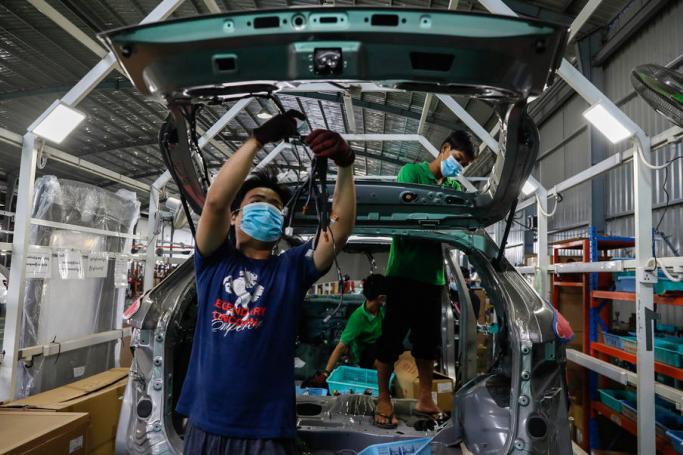The pandemic Covid-19 has bared the underside of the development strategy adopted by most developing countries of Asia during the last two decades, viz., the precarity of the informal workforce which propels the economies. Many of these countries have invested very little on this segment of the workforce, which is large in numbers.
Market-oriented, export and FDI led growth strategies have neglected the informal sector workers, without significantly investing in human capacities and measures to improve the quality of employment. The vulnerability of the informal workers has been exposed during the pandemic wherein millions of wage workers (many are migrants from rural to urban areas) were left to fend themselves due to the lockdown of countries’ economic activities. The distress of these workers has flashed across television screens in many countries.
Most Asian economies are characterized by large informal employment in the non-agriculture sector. Countries like Cambodia, Myanmar has over 80 per cent of informal workers, while others like Bangladesh, Nepal, Indonesia, Laos and India has between 70- 80 per cent. Metro cities and towns of these countries are bustled with daily wage workers and self-employed, earning meagre incomes without having any social security coverage like sick leave, unemployment benefit, health coverage and social transfers often do not reach to all. Incidence of poverty is also found to be high among them.
Writing on the need for protecting informal workers from the pandemic and during post-pandemic recovery, IMF economists identify the need for expanding social security for this segment of workers in Asia. In a blog post titled, A “New Deal” for Informal Workers of Asia, they point out that “… pervasive informality in Asia will also require comprehensive measures to improve the business environment, remove onerous legal and regulatory obstacles (especially for startups), and rationalizing the tax system. Specific policies will depend on country circumstances but should aim to bring informal workers into basic social safety nets while enhancing their productivity”.
Trade unions, civil society, economists and social policy experts in Asia have been advocating for many years the need for covering unorganized sector workers with comprehensive social protection measures. Such policy suggestions have not received traction with the neo-liberal economic thinking as most often social assistance spending is seen as ‘welfare doles’ and frowned upon. Very few schemes were introduced by countries for informal workers in the past. Their coverage was low and faced design and implementation challenges in terms of targeting, the quantum of benefits and costs of operations. It is from this perspective that many advocated ‘universal basic social protection’ instead of means-tested schemes as they result in significant exclusion and are costly.
Now with the Pandemic and the disruption of economic activities across all the sections and sectors, the need for addressing the plight of the informal workers come to the fore. Few countries have already started responding through measures like;
- Expanding existing social assistance programs in terms of coverage and increasing the benefit amount
- Introducing special schemes like In-kind cash transfers for poor household and informal sector labourers; increasing utility subsidies for poor households
- Introducing new transfers for workers not covered by social protection using cashless digital payment systems;
- Establishing public works programs to enhance employment opportunities for workers
- Supporting small businesses and entrepreneurs so that they would be able to retain workers (special grants for micro-enterprises)
Such actions are significant as they would ensure immediate food security, and protection from employment and income loss for the workers. These are short-term to meet the urgent needs of vulnerable people.
IMF economists identify the need to develop coherent and sustainable policy and program for informal sector workers. As part of the “new deal”, post-COVID-19 recovery plans should provide “…an opportunity to address long-standing inequalities – in access to health and basic services, finance and the digital economy – and to enhance social protection for informal workers”.
According to them, an immediate and long term safety net for informal workers may include; investing in public health response, improving health infrastructure and correcting deficiencies in clean water and sanitation; setting up more expansive and inclusive safety nets that would reach the people most at risk more quickly and efficiently (using technology and digital identification systems) and countries investing in digital capacity and bandwidth to reduce digital barriers.
In countries like Myanmar, Covid-19 Economic Recovery Plan (CERP), identifies few social assistance measures for the workers, though the current coverage appears to be modest, to begin with. Since the economic recovery is going to take a long time horizon, the need for expanding the coverage and broad-based fiscal support for different segments has to be accommodated beyond the CERP.
Focusing on internal finances and international financial assistance on the critical social safety nets should be the priority of all the governments in the medium to long term. There is also a need for universalization of social protection, which has been the demand of many policy analysts. This can be an opportunity to institutionalize well designed and cost-effective and universal basic social security for the informal sector workers sustainably.












